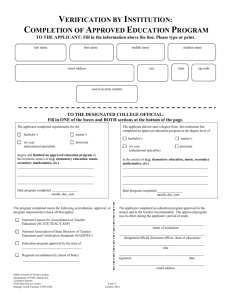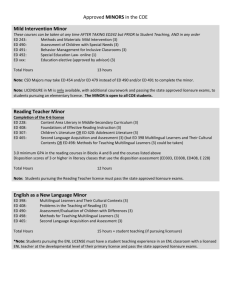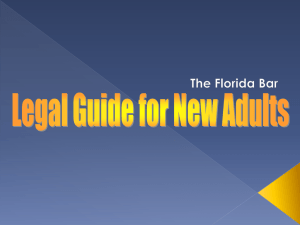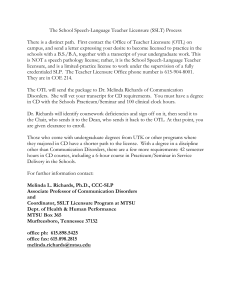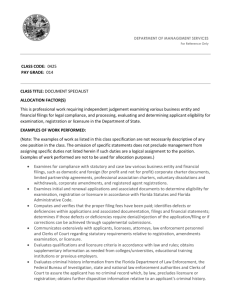Initial Florida Licensure Info - Hillsborough County Medical
advertisement
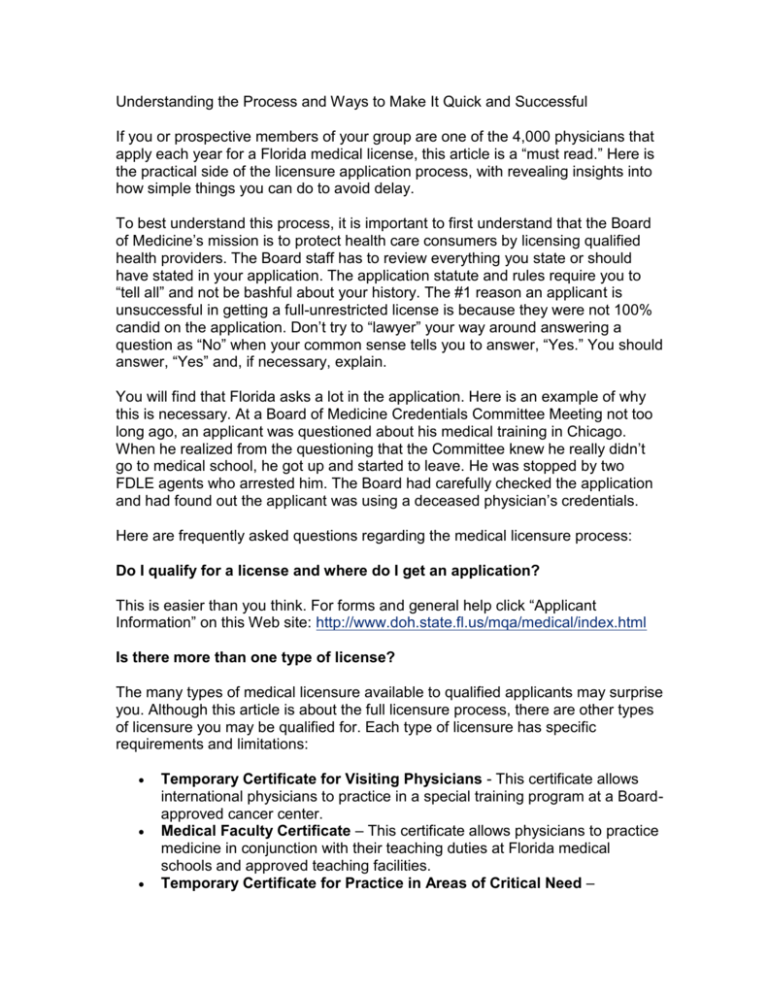
Understanding the Process and Ways to Make It Quick and Successful If you or prospective members of your group are one of the 4,000 physicians that apply each year for a Florida medical license, this article is a “must read.” Here is the practical side of the licensure application process, with revealing insights into how simple things you can do to avoid delay. To best understand this process, it is important to first understand that the Board of Medicine’s mission is to protect health care consumers by licensing qualified health providers. The Board staff has to review everything you state or should have stated in your application. The application statute and rules require you to “tell all” and not be bashful about your history. The #1 reason an applicant is unsuccessful in getting a full-unrestricted license is because they were not 100% candid on the application. Don’t try to “lawyer” your way around answering a question as “No” when your common sense tells you to answer, “Yes.” You should answer, “Yes” and, if necessary, explain. You will find that Florida asks a lot in the application. Here is an example of why this is necessary. At a Board of Medicine Credentials Committee Meeting not too long ago, an applicant was questioned about his medical training in Chicago. When he realized from the questioning that the Committee knew he really didn’t go to medical school, he got up and started to leave. He was stopped by two FDLE agents who arrested him. The Board had carefully checked the application and had found out the applicant was using a deceased physician’s credentials. Here are frequently asked questions regarding the medical licensure process: Do I qualify for a license and where do I get an application? This is easier than you think. For forms and general help click “Applicant Information” on this Web site: http://www.doh.state.fl.us/mqa/medical/index.html Is there more than one type of license? The many types of medical licensure available to qualified applicants may surprise you. Although this article is about the full licensure process, there are other types of licensure you may be qualified for. Each type of licensure has specific requirements and limitations: Temporary Certificate for Visiting Physicians - This certificate allows international physicians to practice in a special training program at a Boardapproved cancer center. Medical Faculty Certificate – This certificate allows physicians to practice medicine in conjunction with their teaching duties at Florida medical schools and approved teaching facilities. Temporary Certificate for Practice in Areas of Critical Need – Physicians licensed under this provision are restricted to practice at a certain approved facility. Public Health and Public Psychiatry Certificates – These certificates allow physicians to practice only in conjunction with employment duties with the Florida Department of Health. Limited License – Physicians licensed under this provision are restricted to practice at a certain approved facility. Most limited license physicians are volunteers who work with county health departments and facilities that treat the indigent citizens of Florida. Resident Physician and House Physician Registration – Physicians in Florida training programs and house physicians employed by Florida hospitals must register with the Board. The training programs and hospitals must report to the Board twice a year all employed physicians that do not have an unrestricted license. (Note: Under Florida law, e-mail addresses are public records. If you do not want your e-mail address released in response to a public records request, do not send electronic mail to this entity. Instead, contact this office by phone or in writing.) I need help filling out the form. The application is lengthy, but not difficult. Board staff can answer questions, but here is your first tip: use email - you can put more detail in it and the staff will be able to concisely answer your question because it will be clearly spelled out in your e-mail. Send your inquiries directly to the person who is handling your application, or email MQA_Medicine@doh.state.fl.us. You may want to consider using a private attorney or licensure consultant if you need more help with the application process than Board staff can provide. The Florida Medical Association can provide you with names. E-mail legal@medone.org. You may also seek assistance from your hospital’s personnel/risk management office if you are already employed at the time you apply. If you do seek assistance from any of these sources, make sure that you don’t rely on others to know all the information that is requested. Spend your time reviewing every question and answer before you sign that application form. Board of Medicine licensure staff spend time at resident training programs to educate residents about applying for licensure. The staff also visits Florida’s medical schools to explain the different licensure avenues. How long does it take? Once your application is COMPLETE and there are no “red flags,” the process takes about 14 days to issue the license. The important word here is “COMPLETE.” If all the information that you are required by law to submit is received, the application is complete. If you do not provide this information, the process will take longer. An important part of the application process is the documentation that must be provided to the Board. The process will go much quicker if you get the documents in as soon as possible. Do not leave this task to someone else – either provide the documents yourself or see that they are quickly provided – follow-up with others that are providing them for you if necessary. This is the #1 delay in application processing. Where do I go if I have a question after I send in the form? Your application goes to a Board of Medicine staff member called a “reviewer.” There are 7 reviewers in the Board of Medicine office. Your reviewer will contact you and will provide you with their name, phone number, fax number and e-mail address so that you will be able to communicate with them. Again, the best way to communicate is by e-mail. The reviewer will have a clear question in front of them, and will be able to research the answer if necessary. This will also give you your answer in writing, in case you need to have it on file. Who makes the decision on my application? Your application, once complete, goes to a supervisor for a second review and then to the Board for approval or denial. At any step along the way a “red flag” on the application may require it to be reviewed by the Program Administrator to determine if the application must go before the Credentials Committee. A “red flag” does not mean denial; it simply means an explanation is necessary. This Board of Medicine’s Credentials Committee meets every two months to review any of the applications that require explanation or more information or perhaps a personal appearance by the applicant. The Board of Medicine is charged with protecting the health care of Florida consumers by licensing only qualified health providers so the Board is required to make this extra inquiry when called for. What really happens to my application when it arrives at the Department of Health? The application arrives at a centralized mailroom at the Department of Health headquarters in Tallahassee. The mail handler that supports all the health care boards directs your application to the Board of Medicine. TIP: send your application and fee to the special address as directed on your application – this will save time. Mail that includes a check is required to go to the vendor that receives all monies for the Department. If you send an overnight letter with a check on Monday, it will not get to your reviewer on Tuesday because it must first go to the vendor. This simple fact of processing unfortunately frustrates applicants who send such mail, and then call the next day and are told the mail is not yet received. Knowing about this step in advance will keep you from being frustrated. After the application is forwarded to the Licensure section at the Board of Medicine, it is assigned to a reviewer, the person who will process your application. The reviewer puts your information into a data bank that will be part of your record for as long as you have a Florida license. Staff Goals: Applications are processed within 30 days of the date received. Emails and mail are processed within five days of the date received. Phone calls returned within 24 hours of the date received. What are the most common problems that slow up and application? NOT BEING COMPLETELY CANDID ABOUT YOUR HISTORY AND EDUCATION is the #1 reason for denial of a full-unrestricted license. Failure to disclose a problem will get you in trouble with the Board far more often than the problem itself. Here are some other causes for delay in your application: Actions during postgraduate training Hospital staff privileges with action/termination of employment Action by a specialty board Action by another state regulatory board Misdemeanor or felony convictions Results of the criminal background check Civil judgments/malpractice Medical, physical, mental or chemical dependence impairment/condition within the last five years Lack of active practice Action by DEA Action by the military Applications that require Petition of Waiver/Variance Do most complete applications get approved? Yes, most applicants are granted an unrestricted Florida medical license. Those applicants who are not issued an unrestricted license may have the following occur: Approval with conditions such as a fine, corrected application and new application fee. Approval with condition such as taking or retaking an examination. The Board may also outright deny the license, or may allow the applicant to withdraw the application. TOP TEN WAYS TO GET YOUR APPLICATION PROCESSED QUICKLY 1. Mail the application to the correct address. 2. Keep in mind that any monies have to be processed by the Department vendor. This may take a couple of days. 3. Identify any variation of names and nicknames. 4. Once you start the process, submit the application within 30 days so that your supplemental documents, including transcripts, will have an application file to go to. 5. Have the correct address on the application for training programs and hospitals. 6. Send in necessary back up documents in a timely manner. 7. Follow up with sources that are sending the Board of Medicine your documents. 8. Watch for letters or e-mail from your reviewer. This is how we tell you what else is needed for your application to be complete. 9. If asked for follow-up information from the Board, please read the request carefully to identify exactly what is needed to make your application complete. 10. Answer questions honestly and provide an explanation where appropriate. A great deal of the Board of Medicine’s staff time is dedicated to processing medical license applications. The Board of Medicine and its staff are charged with licensing those applicants that qualify for licensure under state law who can safely practice medicine. The Board works very hard to ensure that all of this is done in a timely manner. Knowing how the process works will help to ensure that your application is handled expeditiously.
